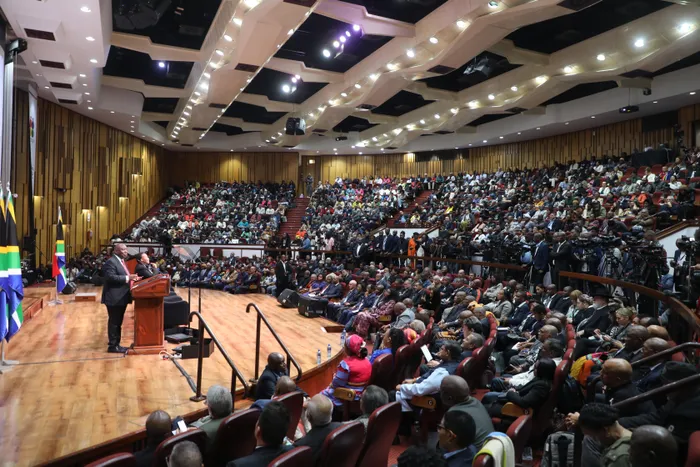Is the National Dialogue a Solution to South Africa's Challenges?

President Cyril Ramaphosa addressing delegates at the national convention, marking the opening of the National Dialogue. The writer explores the objectives of the dialogue and evaluates past government initiatives to assess whether the current approach can truly lead to meaningful change.
Image: Oupa Mokoena / Independent Media
Dr Sihle Sibiya
It is our view that the current National Dialogue is a waste of time and resources which must be effectively utilised to respond to poor leadership, corruption, unemployment, poverty and inequality.
The following is what we have gathered as the objectives of the national dialogue:
- To provide a chance for all South Africans, from all walks of life, to come together and help shape the next chapter of our democracy
- To define a vision for our country for the next 30 years
- To bring South Africans together, heal past wounds, and chart a common path forward
It will be interesting to know how this national dialogue is going to be measured if it has achieved the above objectives. Government started with short term plans and policies that were driven by experts. Those include the following:
- Reconstruction and Development Programme (RDP)which was a socio-economic policy aims to address the inequalities and socio-economic challenges inherited from the apartheid era with a particular emphasis on poverty alleviation, job creation, and the provision of basic services (1994)
- Growth, Employment, and Redistribution (GEAR) was a macroeconomic strategy adopted in 1996. It aimed to transform the economy into a more competitive, outward-oriented system with increased exports, investment, and labor absorption.
- Accelerated and Shared Growth Initiative for South Africa (AsgiSA) (2006) with a mandate to reduce unemployment and poverty, while increasing the country’s gross domestic product growth rate to a sustainable level of 6% by 2010.
- The National Development Plan, which is a plan for the country to eliminate poverty and reduce inequality by 2030 through uniting South. (2012)
- The Economic Reconstruction and Recovery Plan (ERR) (2020), which was a plan to create sustainable, resilient and inclusive economy.
It will be of public interest to know if our government is currently implementing the NDP or the ERR.
The NDP has been the longest and it was also developed by experts; It will be interesting to know if the current dialogue is the admission of the failed construction of the above plans and policies? The second question is how the lessons from the above plans and policies will be infused into the shaping of the new vision?
It is also important to acknowledge that political parties develop and mobilize support using a manifesto. The people vote for the promises made in the manifesto. The Governing party through State of the nation address (SONA) outlines what will be the focus for each financial year in achieving what was promised to voters through a manifesto.
Each government department plans get developed and budgeted for in alignment with the SONA promises. The other question is how are all the above going to be aligned to the national dialogue outcome? Political parties and leaders get funded by business with interest in most cases different from me and you.
The question is what will guide the ambitious interests from funders of which some of them are foreign? The other question is which side the national dialogue is going to prioritize between voters and the political funders from the fact that the system has shown that political funders have more power than the voter.
The environmental assessment of government is that it is at its peak when it comes to corruption, basic standard of living is at its highest, high unemployment and inequality. How are we expected to be united if there are those advancing their interest in having Western cape declare their country and having Orania and other communities designated for a particular race?
Is the national dialogue an admission of failure by the GNU led by the ANC? Our economy is import centric and this is implemented and sustained by government. Government refused free open-source implementation, which was going to develop local skills, expertise and create jobs.
The 700 million can establish two fruit processing plants in the north coast of KZN and another one in Limpopo. This can create thousands of jobs and better agriculture and economic activities of these two provinces.
In contributing to active citizenry telecommunication companies must provide free data sim cards to unemployed, learners and students. It has been our submission that the country’s vision must be anchored on the following SEE strategic pillars:
If the ANC has failed to successfully implement those plans and policies when the challenges were not as complex as today how can we trust that they will be able to implement the outcomes of the dialogue?
*** The views expressed here do not necessarily represent those of Independent Media or IOL
** Dr Sihle Sibiya is the chairperson of the Insika Economic Movement, a community based nonpartisan and nonprofit organisation that believes in a fair inclusive sustainable economic system.
IOL Opinion